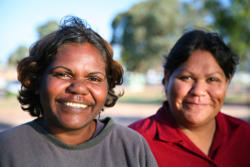
October, Australia’s Breast Cancer Awareness Month, provides an opportunity for us all to focus on breast cancer and its impact on those affected by the disease in our community.
Breast cancer remains the most common cancer among Australian women (excluding non-melanoma skin cancer). Survival rates continue to improve in Australia with 89 out of every 100 women diagnosed with invasive breast cancer now surviving five or more years beyond diagnosis.
Take the time this month to find out what you need to know about breast awareness and share this important information with your family, friends and colleagues.
[accordion]
Be breast aware
 Finding breast cancer early provides the best chance of surviving the disease. Remember you don’t need to be an expert or use a special technique to check your breasts.
Finding breast cancer early provides the best chance of surviving the disease. Remember you don’t need to be an expert or use a special technique to check your breasts.
Changes to look for include:
- a new lump or lumpiness, especially if it's only in one breast
- a change in the size or shape of your breast
- a change to the nipple, such as crusting, ulcer, redness or inversion
- a nipple discharge that occurs without squeezing
- a change in the skin of your breast such as redness or dimpling
- an unusual pain that doesn't go away.
Most changes aren’t due to breast cancer but it’s important to see your doctor without delay if you notice any of these changes.
More information on breast changes
View a short breast changes video (YouTube)
Breast cancer risk factors
It is important to separate the fact from the fiction about risk factors for breast cancer. With an understanding of the things that may increase your chance of developing breast cancer, you can take positive steps to reduce your risk.
Find out more risk and breast cancer on our Breast Cancer Rsk Factors website.
Find out more about breast cancer in Aboriginal and Torres Strait Islander women
 Breast cancer is the most common cancer experienced by Aboriginal and Torres Strait Islander women and is the second leading cause of cancer death after lung cancer. Research shows that survival is lower in Aboriginal and Torres Strait Islander women diagnosed with breast cancer than in the general population.
Breast cancer is the most common cancer experienced by Aboriginal and Torres Strait Islander women and is the second leading cause of cancer death after lung cancer. Research shows that survival is lower in Aboriginal and Torres Strait Islander women diagnosed with breast cancer than in the general population.
Cancer Australia is committed to working with Aboriginal and Torres Strait Islander communities to provide women with important information about breast cancer awareness, early detection as well as breast cancer treatment and care.
- My breast cancer journey: a guide for Aboriginal and Torres Strait Islander women and their families
- What every Aboriginal and Torres Strait Islander woman should know about breast changes video
- Breast cancer and Aboriginal and Torres Strait Islander women
- Cancer in Aboriginal and Torres Strait Islander peoples of Australia: an overview
[/accordion]
